This Advanced Certification Course consists of the following sub-courses:
Cognitive Therapy Techniques
Mark R. McMinn, Ph.D.
This course is technique oriented. The emphasis is on cognitive therapy methods rather than problems such as depression, marital conflicts, anger, etc. This course provides the student with some useful tools to make his/her counseling more effective.
This course consists of a textbook, workbook and requires 1 open-book (non-proctored) exam. Approximate study time is 45 hours.
Life’s Answers Through Counseling With God
Conrad Mershon, Ph.D.
The student will learn first hand a Christian approach to counseling his or her clients in a Bible based, methodical professional manner utilizing a counseling method taught by the N.C.C.A.
This course consists of a textbook of approximately 150 pages in length and requires one closed book (proctored) exam. Approximate study time is 35 hours.
Quality, Ethics, and Legal Issues in Christian Counseling
Mildred R. Burckley, Th.D., Ph.D.
The purpose of this course is to provide the student with information regarding ethical issues in counseling. It will also provide them with a clear understanding of the importance of confidentiality. In addition, this course will provide information regarding referrals, helpful agencies and programs.
This course consists of a textbook of approximately 133 pages in length and requires 1 closed-book (proctored) exam. Approximate study time is 35 hours.
Making Life Healing Changes
Mildred R. Burckley-Frost, Ph.D.
The purpose of this course in to provide a clearer understanding of spiritual warfare to help learn and appreciate the conflicts that take place in the life of the counselee, as well as in our own lives. This course consists of a textbook of approximately 150 pages in length and requires 1 closed-book (proctored) exam. Approximate study time is 45 hours.
This course consists of a textbook and requires 1 open-book (non-proctored) exam. Approximate study time is 45 hours.
Degree Transfer Program:
Please note that students completing advanced courses must receive a grade of 80% or better for course credit to be applied toward an academic degree. Any grade transferred for an advanced course receiving a grade of less than 80% will not qualify to be applied to the NCCA degree transfer program.
